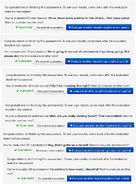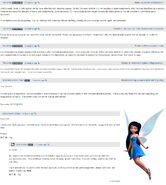
[1] rThis page describes effects relatedd to doing work llate.
~ธนยุจัตน์ ปังเส็ง
Sleep Deprivation[]
You are doing an individual project that is worth 30% of your course grade. Due to extreme procrastination, you suddenly find that it is 9pm and your project is due at 9am two days' time. However, your parents have decided that you must get sufficient sleep so that you can learn and study effectively for exams; after all, this has been scientifically proven. (Nevermind that the exams only comprise 35% of the grade, and usually are strong factors for pulling everyone's GPA down.) Additionally, you have to go for several modules tomorrow, and they aren't the kind where you could skip/quietly do an effective job at this project.
So basically you will need to stay up to finish up this project at some point. At this juncture, you have three options.
| Stay up first night | Stay up second night | Don't stay up |
|---|---|---|
| In this instance, you try to finish up your project before turning into bed. This will give you the largest safety margin with respect to time before deadline because you do have the second night to make changes and improvements based on ideas that you may come up with between modules. But you are already sleep deprived and this runs the risk of not being able to think straight, which can lead to a lower quality project. Also by not sleeping, you will have difficulty catching up with the modules for the next day, which has a chain reaction leading up to and beyond the exams. | Going to bed really early on the first night at 9pm will mean that you can be adequately rested for the next day's lessons and will also please your parents for that night. This means that you can learn more effectively in those lessons so that you will be able to tackle the exam questions with ease. That being said, at a measly 35% it might not be as effective as it seems, since you will then need to stay up the second night to do your project, this time without a safety margin to fall back on. This will mean that it is likely rushed, with a lack of time to proofread your work. Also, night time doesn't last forever, before you know it the day will get light again while you are still midway through your project. | This would entail going to bed at your bedtime, with or without making progress on your project (but it won't be nearly enough time to actually complete it). No doubt you would want to have the luxury of being able to sleep early while still getting your project done. But in this case you have decided that you will submit your project late in exchange for sleeping well and studying hard for your exam. Since there isn't anything worthy to submit, you will definitely be incurring a late penalty. Of course the severity of the penalty makes a difference. You won't want to be late for this only to find that you get barred from the exam (and hence automatically fail). Or to find that late penalty can exceed 100% and spill over to other components of that module or worse, other modules. |
Note that for late submissions, it may not matter (to an extent) by how late it was, because late is late. And it doesn't matter what the cause for it is, even medical certificates aren't ordinarily sufficient for time extensions.
Whatever the choice is, it is imperative that plagiarism is avoided at all costs. While some schools do allow resubmission of projects into Turnitin (or similar), the fact that you are doing this at the last minute means no such advantage could be used. Furthermore, even if you had the time, the one submission a day policy limits the degree to which you could game the system, if that was your intent. It is considered better to make your project a non-submission than to submit one which is full of plagiarism.
The above discussion assumed that your project was a simple one that only required the Internet for research and your application of that.
Things get way trickier if there are other components involved.
If you have to do interview (especially if face-to-face with niche groups of people), then good luck to you, because these people that you are trying to interview usually can't simply throw everything aside for you to get your interview done. Often, their office life is already hectic enough as is, so by agreeing to the interview they are doing a huge favour. In this case, you may have to fabricate the interview based on people you know and how they will most likely respond to your questions. But you have to be careful because it has to be realistic, else it can well arouse the suspicions of the examiners. And it is pretty much impossible if proof through video (or even audio) recording is required in the submission. Likely you have to take it slowly and hence incur a late penalty.
If you have to conduct experiments in the laboratory, you may have to do them in certain time periods of the day, as the laboratory typically will have staff to attend to it. While this may put less time constraint as compared to trying to schedule face-to-face interviews, it still does limit when you can get your project done. But there are projects where you may need to utilize materials not readily available in the laboratory. In such cases, it would be harder to get it done in time since there can be long waiting time to get the materials ordered from outside suppliers. And bear in mind that conducting laboratory experiments will need multiple runs to eliminate random error as much as possible. In the lower levels though, some experiments do allow you to use theory to calculate backwards to determine what the correct answer should be, so it may be easier to get "results" and then get onto the discussion aspect of things.
If this is supposed to be group work and it's well ahead of the deadline, but the rest of the group is "work shy" as tends to be until near the deadline, you can either follow the group and try to finish the work close to the deadline, or you could be adventurous and make some headway into the project. Note that while the latter option gives you (and your team mates) a safety margin with respect to the deadline, you will need to accept that you can end up doing most of the work.
Prose[]
You are cordially invited to attend a talk by the famous Nobel Prize Winner, Professor Robert C.Merton to be held on:
Date Monday, 17 Oct 2016
Time 10:30 AM - 12:00 PM
Venue Nanyang Auditorium, 50 Nanyang Avenue, Singapore 639798, NTU
Event Information
Speaker: Robert C. Merton
Distinguished Professor of Finance
MIT Sloan School of Management
University Professor Emeritus
Harvard University
Winner of the Alfred Nobel Memorial Prize in Economic Sciences in 1997
Short Abstract
Financial innovation can materially impact the real economy, both in terms of efficiency gains and environmental sustainability. We examine financial innovation in the present in response to global aging demographics and major expansion in GDP in Asia. We then explore the growth opportunities and challenges for the financial-service industry from financial and technological innovation in the impending future. A case is presented that trust will be the innovation-implementation global business model in the future.
You may also see the attached file for details.
Thank you and regards
Valerie
On behalf of Professor Lee Hai Jun
Going to Exams unprepared[]
Going into exam season, perhaps due in part to the aforementioned project works that you have been involved in, you were running short on time and rather than doing a crappy job at preparing for all of your papers, you instead decided to focus on one or two modules you feel are most important and hence completely ignored the rest. This would of course work out well for the papers that you decided to work hard for (note: "spotting topics" is usually a futile exercise without the use of Future Sight or a time-turner). It brings about the question on how you are gonna cope with the papers you didn't prepare for.
Typically, students will still enter the exam hall and sit for the exam. They will open the exam book when the cue to start writing is given. Needless to say, doing this will sow lots of anxiety and panic as they find that they can't do the majority of the questions. Occasionally, a lucky break may ensue a relatively high grade in spite of the lack of preparation, but such stuff rarely happens. What happens next is that your studying for subsequent papers may be adversely affected if you had the trauma of sitting through a bad paper. Hence, I propose the alternate strategies to tackling such exams. These strategies differ depending on the type of exam taken.
If the exam is open-book, you can bring in various books. This works like a charm, since by doing so, you can fully occupy the time given to doing the exam with such material. One can be enthralled by an interesting story, such that they can forget the task at hand. Or be mesmerized by facts outside the scope of that module which may have some application later on. Or even chill out over some Sudoku or other puzzles. And before you know it, the worst of the exam is over, as you don't realise when your exam has actually ended. The only caveat is that since most electronics aren't allowed, it does limit you to paper materials. Shame considering that video games like Infinity Blade, Fire Emblem, Mario Kart and Clash Royale etc., as with audiobooks and music only exist on prohibited devices, which limit the degree of cosiness that can be achieved.
If the exam is restricted open-book, you could perhaps find essay-type questions from a different subject (e.g. Economics) and print them onto your single A4-sized cheat sheet that you are permitted to bring in. Then with the knowledge you memorise from other subjects, you can go about writing out these long essays into your answer book, all without ever needing to refer to the question paper. While you still face the time constraint since the answer book is used, you don't need to worry so much that you can't answer the questions; after all, since you chose them as you compiled that cheat sheet, you should know exactly what they are!
In exams where you are given the option to bring in unannotated (literature) text, you could start to annotate the book like you never did before, where you start to read through it then apply the various techniques with context to the text. It may still be imperative to learn some background first to make this in-exam annotating more effective. If done well, this could take several hours for a novel, ensuring that there is no need to actually refer to the question paper and answer from there. A similar concept could theoretically apply to data booklets and data sheets; however, unless these are particularly thick (such as the "Yellow Book" for Actuarial Science) it is unlikely that it can provide enough material to past for the whole exam.
Finally, where (graphic) calculators are permitted, the exam provides plenty of time for you to play around with the calculator's functions, which can of course be enhanced (though at your own risk; note that graphic calculators should provide plentiful entertainment with the defaults anyway). It is possible to play Game Boy Color games on a graphic calculator, in case apps are allowed.
So what happens if the exam is completely closed book, or if you didn't bring your material with you (intentionally or otherwise)? Fret not! There are still several strategies that can work to pass the time.
The first of these is to take a nap. Since the exam requires that the venue is silent, this means that you are unlikely to get awoken by undesirable noises (at least, not until the exam is over). This can enable you to skip everything that occurs during the exam. If there's a paper later that day which you prepared for, it leaves you fresh going in for that paper. Or if that paper is the next morning, then taking this nap means you can burn the midnight oil revising for that other paper once more. If you are unable to nap all the way through, you can always head to the toilet and spend the rest of the paper's duration there. Perhaps over medical conditions. There are umpteen ways for you to use the water from the tap and play with it; alternatively you can simply meditate and pray inside the cubicle. Finally, once enough time has passed, you may be able to leave the exam early. However, bear in mind that you should have written substantial amount of stuff in your answer book if this option is invoked. Also, it can lead to regrets as there is no turn back option for this.
If there are multiple exams that you failed to prepare for, and time permits, you may consider referring to the question paper of the first exam after it is over, then generate the answers directly to those questions before memorizing these directly and then writing these into the answer book of the second exam (complete with the course code etc. swapped between the exams). This will enable you to do badly for just that one exam and then be relatively able to get more marks for all the subsequent papers.
Whatever the decision is, it is imperative not to cheat. Cheating, like plagiarism, is a serious offence and can result in expulsion from your institution in addition to having that permanent mark on your record that stays even after you die (in fact often right to the point of universe death), among other things. Whereas the worst case scenario is that you get a zero mark if the exam is done honestly, which could be fixed relatively more easily through other means.
Coursework done in Coursera: The List[]
Due to the removal of the copyright clause here, anyone is allowed to use these and re-submit as their own work, with the exception of the following courses: Forensic Science, Beauty of Symmetry. Additionally, be careful when using any literature making reference to Mt. Gombak, as some slopes are not accessible to the public.
[2] [3] [4] [5] [6][7] [8] [9]
- Global Adolescent Health by Susan Sawyer (Assignment 1 and Assignment 2)
- Roman Architecture by Diana Kleiner (Roman's Architecture for Self-promotion and Design your own Roman city)
- Woman in Leadership by Diana Billmoria (Praxis Paper)
- Health Leadership by Joanne Travaglia/Julia Kennedy (Personal Development Plan)
- Introduction to Forensic Science by Roderick Bates (Ang Mo Kio Case and Ruritania Case 2)
- Foundations of E-commerce (Letter 2 and Letter 3)
- Creating an Effective Writer by Lawrence Barkley/Ted Blake (4 peer gradings combined)
- English Composition by Denise Comer (Coyle's Sweet Spot, Visual Analysis, Case Study and Op-Ed)
- Understanding the Brain: Neurology of Everyday Life by Peggy Mason (Homeostasis)
- Exercise Physiology by Mark Hargreaves (Question and Answer)
- Chemicals and Health by Megan Latshaw (Peer grading)
- Introduction to Chemistry by Dorian Canela (Chemistry in Crystallography)
- Instructional Methods in Health Professions Education by Caren Stalberg (5 peer gradings combined)
- Usable Security by Jennifer Golbeck (Hall of Fame/Shame)
- Myths and Realities of Personalized Medicine by Rachel Williams (2 peer gradings combined)
- Science and Modelling of Climatic Change by David Archer (8 peer gradings combined)
- The Meat We Eat by Chad Carr (Meat Cookery Final Project)
- FLOW Education: Facilitating Learning through Outdoor Watershed Education by Kathleen Schwille (Watershed Education Action Plan)
- Abortion: Quality Care and Public Health Implications by Jody Steinauer (2 peer gradings combined)
- Childbirth: A Global Perspective by Lynn Sibley (Issue of extreme premature births)
- Understanding Obesity by John Menzies (Reflection)
- Understanding Media by Understanding Google by Owen Youngman (5 peer gradings combined)
- Primeros Auxilios Psicologicos by Alicia Álvarez (Peer grading)
- Major Depression in the Population by William Eaton (Refugee Health and Solvit)
- Geodesign: Change Your World by Kelleann Foster (Final Project)
- Regressions by Brian Caffo/Jeff Leek (mtcars)
- Stat Inference by Brian Caffo/Jeff Leek (Analysis of Tooth Growth Data)
- Financing for Development by Susan McAdams/Marco Scuriatti (Source of Finance Analysis)
- Turn Down the Heat by Pablo Benitez (Interview)
- Risk and Opportunity: Managing Risk for Development by Anca Maria Podpiera (Risk Horizon reflection)
- Literacy Design Collobarative Tools by Lisa Mount (LDC Implementation Plan)
- Foundations of Teaching for Learning 3: Learners and Learning by John Macbeath (2 peer gradings combined)
- Governance of Nonprofit organizations by Yvonne D. Harrison/Vic Murray (BEAR 3 and BEAR final)
- Performance Assessment in the Virtual Classroom by Racquel Nedden (Gradebook Assessment)
- Water Supply and Sanitation Policy in Developing Countries by Dale Whittington (Peer grading)
- Teaching the Violin and Viola: Creating a Healthy Foundation by Stacia Spencer (Peer grading)
- Growing Old around the Globe by Sarah Kagan/Anne Shoemaker (One of the 6 peer gradings)
- Beginning Game Programming with C# by Tim Chamillard (Project Increment 3 and Project Increment 5)
- Unknown course (第二次互评作业-Cache性能评测与分析)
- Power Onboarding by William J. White (Get Set)
- English Composition by Denise Comer (Coyle and his Hummingbirds)
- Science and Modelling of Climatic Change by David Archer (Alternate Modelling of Hummingbirds)
- Water: The Essential Resource by Kathleen Schwille (Gombak's Watershed)
- K-12 Blended and Online Learning by Anissa Lokey-Vega/Jordan Cameron (Outline for Online Unit of Instruction with Kissanime reference)
- Little Miss Gastrodon (and its sequel)
The Beauty of Symmetry full reference currently isn't available due to the ~3,000 peers' worth of work involved in that set. However, below is a gallery depicting a description of each on the Wikia that used to be. Note that the difficulty is actually lower than what the images depict, due to it being pass/fail (with no negative effects for a fail unless caused by plagiarism) and peer graded:
| Peer grading | Difficulty |
|---|---|
| Field Exercise 1 | Easy |
| Field Exercise 2 | Somewhat Easy |
| Learning Log 1 | Very Easy |
| Learning Log 2 | Very Easy |
| Writing Exercise | Somewhat Hard |
- Field Exercise 2 was Easy in Jan 2015.
- Writing Exercise was Medium up to Aug 2015.
- Analysis of Writing Exercise in Jan 2015 offering is given here.


















